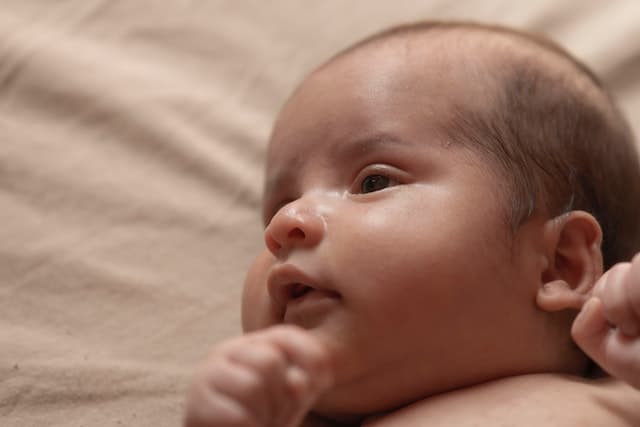Babies shaking their heads back and forth can be a common behavior that may concern parents or caregivers.
While it can be alarming to see a baby shake their head, it is important to understand that this behavior is often normal and a part of their development.
Normal development and head shaking often go hand in hand. Infants may shake their heads as a way to soothe themselves or to communicate with others, especially before they can use words.
As they grow and develop, they may continue to shake their heads as they explore their environment and learn about cause and effect.
However, there are also cases where head shaking can be a sign of an underlying issue. In some cases, head shaking can be a symptom of autism spectrum disorder or other developmental delays.
It is important for parents and caregivers to be aware of when to consult a pediatrician if they have concerns about their child’s head shaking behavior.
Key Takeaways
- Head shaking is often a normal behavior in babies, but it can also be a sign of an underlying issue.
- Infants may shake their heads as a way to soothe themselves or communicate with others.
- Parents and caregivers should be aware of when to consult a pediatrician if they have concerns about their child’s head shaking behavior.
Understanding Babies’ Head Shaking Behavior
Babies are known for their adorable and sometimes quirky behaviors, one of which is head shaking. It is a common behavior observed in babies and can have different meanings depending on the context.
In this section, we will explore the reasons why babies shake their heads back and forth.
Self-Soothing Behavior
One reason why babies shake their heads is to self-soothe. Head shaking can be a comforting and calming activity for babies, especially when they are feeling fussy or tired. It can help them relax and fall asleep.
Motor Skills Development
Head shaking is also a way for babies to develop their motor skills. As they move their head back and forth, they are strengthening the muscles in their neck and improving their coordination.
Communicating and Interacting
Babies also shake their heads to communicate and interact with their parents or caregivers. For example, they may shake their head to indicate that they want more food or are done eating. They may also shake their head to show excitement or pleasure.
Fun and Play
Babies may also shake their heads simply because it is fun and playful. It can be a way for them to explore their environment and experiment with different movements.
In conclusion, head shaking is a common behavior in babies that can have different meanings depending on the context. Whether it is for self-soothing, motor skills development, communicating and interacting, or just for fun, it is important for parents to observe their baby’s behavior and respond accordingly.
Normal Development and Head Shaking
It is normal for babies to shake their head back and forth as a way of exploring their environment and developing their motor skills. In fact, head shaking is a common developmental milestone in the first year of life.
During the first few months of life, babies may shake their head while self-soothing or communicating their needs. As they grow and develop, head shaking may become a way for them to explore their surroundings and gain a better understanding of their environment.
While head shaking is a normal part of development, it is important to monitor your baby’s behavior and ensure that it is not excessive or interfering with other developmental milestones.
If you have concerns about your baby’s head shaking, it is important to speak with your pediatrician.
Overall, head shaking is a natural part of a baby’s development and can be a sign of healthy exploration and growth. As long as it is not excessive or interfering with other developmental milestones, there is no cause for concern.
When to Consult a Pediatrician
If a baby is shaking their head back and forth excessively, it may be a cause for concern. While it can be a normal part of development for some babies, it can also be a sign of an underlying issue.
Here are some symptoms to watch out for and when to seek medical attention:
Symptoms
If the baby is shaking their head back and forth and displaying any of the following symptoms, it is important to consult a pediatrician:
- Fever
- Seizure
- Pain
- Unresponsiveness
When to Seek Medical Attention
If the baby is shaking their head back and forth and displaying any of the symptoms listed above, it is important to seek medical attention immediately.
If the baby is not displaying any of these symptoms, but the head shaking persists for more than a few minutes at a time, or occurs frequently throughout the day, it is also important to consult a pediatrician.
Underlying Causes
There are several underlying causes that can lead to a baby shaking their head back and forth, including:
- Ear infections
- Teething
- Acid reflux
- Developmental delays
- Neurological disorders
Caregiver’s Role
If a caregiver notices a baby shaking their head back and forth excessively, it is important to remain calm and seek medical attention if necessary. The caregiver can also provide comfort to the baby by holding and comforting them during the episode.
American Academy of Pediatrics
The American Academy of Pediatrics recommends that parents and caregivers consult a pediatrician if they have any concerns about their baby’s development or behavior. It is always better to err on the side of caution and seek medical attention if there are any concerns about a baby’s health and well-being.
Head Shaking and Autism Spectrum Disorder
Head shaking is a common behavior among babies and toddlers. However, in some cases, it may be a sign of an underlying condition such as Autism Spectrum Disorder (ASD).
ASD is a developmental disorder that affects communication, social interaction, and behavior.
Children with ASD often have difficulty with eye contact and social interaction. They may also have delayed language development and challenges with communication, including a condition called Primary Progressive Aphasia (PPA). Head shaking can be a symptom of ASD, but it is not always present.
It is important to note that head shaking alone is not enough to diagnose ASD. A proper diagnosis requires a comprehensive evaluation by a qualified healthcare professional. The evaluation may include assessments of communication, social interaction, and behavior, as well as developmental milestones.
If a child is diagnosed with ASD, early intervention is crucial. Treatment options may include behavioral therapy, speech therapy, and medication. The goal of treatment is to address the child’s specific needs and improve their overall quality of life.
In summary, head shaking can be a symptom of ASD, but it is not always present. A proper diagnosis requires a comprehensive evaluation by a qualified healthcare professional. Early intervention is crucial for children with ASD to improve their overall quality of life.
Other Possible Causes of Head Shaking
While head shaking is a common behavior in babies, it may also be a sign of underlying health issues. Here are some other possible causes of head shaking in babies:
Ear Infection
An ear infection can cause discomfort and pain in the ear, leading to head shaking as a way to relieve the discomfort. Other symptoms of an ear infection may include fever, irritability, and pulling at the ear.
Stress
Stress can also cause head shaking in babies. This may be due to changes in routine, such as starting daycare or a new caregiver. Babies may also shake their heads when they are overstimulated or overwhelmed.
Epilepsy
In rare cases, head shaking may be a sign of epilepsy in babies. Epilepsy is a neurological disorder that causes seizures. Other symptoms of epilepsy may include staring spells, twitching, and loss of consciousness.
Illness
Head shaking may also be a symptom of an underlying illness, such as a viral infection or a metabolic disorder. Other symptoms may include fever, lethargy, and poor appetite.
Rhombencephalosynapsis
Rhombencephalosynapsis is a rare brain malformation that can cause head shaking in babies. This condition affects the development of the cerebellum, which is responsible for coordination and balance. Other symptoms may include delayed development, seizures, and vision problems.
It is important to note that head shaking alone is not necessarily a sign of a serious health issue. However, if you are concerned about your baby’s head shaking or if it is accompanied by other symptoms, it is important to speak with your pediatrician to rule out any underlying health issues.
Treatment and Intervention Strategies
When a baby is shaking their head back and forth, it is important to identify the underlying cause of the behavior. Once the cause has been identified, appropriate treatment and intervention strategies can be implemented.
Physician Monitoring
In many cases, physician monitoring is necessary to ensure the baby’s safety and well-being. If the baby is experiencing a medical condition or developmental delay, the physician may recommend a treatment plan. This may include medication, therapy, or surgery, depending on the specific condition.
Behavioral Strategies
If the baby is shaking their head back and forth as a self-soothing behavior, parents and caregivers can implement behavioral strategies to help the baby learn new coping mechanisms.
These may include providing a safe and soothing environment, using positive reinforcement, and redirecting the baby’s attention to other activities.
Sensory Integration Therapy
For babies who are experiencing sensory processing issues, sensory integration therapy may be helpful. This type of therapy involves exposing the baby to different types of sensory input in a controlled and structured environment.
The goal is to help the baby learn to process sensory information more effectively.
Speech and Language Therapy
In some cases, babies may shake their head back and forth as a result of speech and language delays. Speech and language therapy can help the baby develop communication skills and reduce frustration, which may in turn reduce the head shaking behavior.
Overall, treatment and intervention strategies for babies who shake their head back and forth will vary depending on the underlying cause of the behavior. It is important to work closely with a physician or other healthcare professional to develop an appropriate plan of care.
Tips for Parents and Caregivers
Babies shaking their head back and forth can be a normal part of their development. However, it can also be a sign of stress, attention-seeking behavior, or a medical issue. As a parent or caregiver, it is important to understand why a baby may be shaking their head and how to respond appropriately.
Here are some tips to help you:
-
Observe the baby’s behavior: If the baby is shaking their head while smiling and interacting with you, it may be a normal behavior. However, if the baby is shaking their head aggressively, crying, or seems distressed, it may be a sign of stress or discomfort. In such cases, try to identify the source of stress and address it accordingly.
-
Interact with the baby: Babies may shake their head as a way of seeking attention or expressing excitement. As a parent or caregiver, it is important to interact with the baby and provide them with the attention they need. Talk to the baby, play with them, and show them affection to help them feel secure and loved.
-
Reduce stress: Babies may shake their head as a way of coping with stress. As a parent or caregiver, it is important to create a nurturing and calming environment for the baby. Reduce noise, bright lights, and other stimuli that may cause stress. Provide the baby with a comfortable and safe space to rest and play.
-
Seek medical attention: If the baby’s head shaking is accompanied by other symptoms such as fever, vomiting, or lethargy, it may be a sign of a medical issue. In such cases, it is important to seek medical attention immediately.
In conclusion, head shaking is a common behavior in babies, but it is important to observe the baby’s behavior and respond appropriately.
By interacting with the baby, reducing stress, and seeking medical attention when necessary, parents and caregivers can help ensure the baby’s well-being and development.
Conclusion
In conclusion, it is normal for babies to shake their head back and forth as a form of self-soothing or exploration. However, it is important for parents and caregivers to monitor the frequency and intensity of the head shaking.
If the shaking seems excessive or accompanied by other concerning symptoms, it is recommended to seek medical advice.
Here are some key takeaways to keep in mind:
- Head shaking is a common behavior in babies and can serve various purposes.
- Most of the time, head shaking is harmless and does not require intervention.
- If the shaking seems excessive or accompanied by other concerning symptoms, it is recommended to seek medical advice.
- Parents and caregivers should provide a safe and stimulating environment for babies to explore and play, while also monitoring their behavior for any signs of distress or discomfort.
Overall, understanding and responding to a baby’s behavior can be challenging, but it is an important part of caregiving. By staying informed and attentive, parents and caregivers can help support a baby’s healthy development and well-being.
Related Posts:
Frequently Asked Questions
What causes a baby to shake their head back and forth?
Babies shake their head back and forth for a variety of reasons. One of the most common reasons is that they are trying to soothe themselves or fall asleep. This motion can be comforting to them and help them relax. Additionally, babies may shake their head to communicate or express excitement or frustration.
Is it normal for babies to shake their head side to side?
Yes, it is normal for babies to shake their head side to side. This is often a sign of engagement or curiosity. Babies may also shake their head when they are trying to communicate or express themselves.
Why does my baby shake their head really fast?
If your baby is shaking their head really fast, it may be a sign of a medical condition. It is important to consult with your pediatrician if you notice this behavior in your baby. In some cases, it may be a sign of a neurological disorder or an ear infection.
Can reflux cause a baby to shake their head side to side?
Reflux can cause a baby to shake their head side to side, but it is not a common symptom. If your baby is experiencing reflux, they may also have other symptoms such as spitting up or discomfort during feeding.
What milestones should a baby reach with head movement?
Babies typically reach several milestones with head movement in their first year of life. By 2 months old, most babies can lift their head briefly while lying on their stomach.
By 4 months old, most babies can hold their head steady while sitting with support. By 6 months old, most babies can sit up with support and turn their head to follow objects.
How can I help my baby if they are shaking their head excessively?
If your baby is shaking their head excessively, it is important to consult with your pediatrician to rule out any underlying medical conditions. In some cases, this behavior may be a sign of discomfort or frustration, and your pediatrician may be able to offer suggestions for soothing your baby.

Iesha is a loving mother of 2 beautiful children. She’s an active parent who enjoys indoor and outdoor adventures with her family. Her mission is to share practical and realistic parenting advice to help the parenting community becoming stronger.



